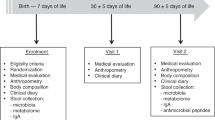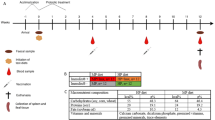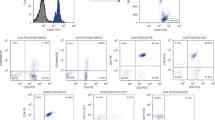Abstract
Objective: To define the cellular basis for immune enhancement by a probiotic lactic acid bacteria strain (Bifidobacterium lactis HN019); and to determine whether immune enhancement can be optimized by delivery in oligosaccharide-enriched low-fat milk.
Design: A double-blind, three-stage before-and-after intervention trial.
Setting: Taipei Medical College Hospital, Taipei, Taiwan.
Subjects: Fifty healthy Taiwanese citizens (age range 41–81; median 60) randomly allocated to two groups.
Interventions: In stage 1 (run-in control stage) all subjects consumed reconstituted low-fat milk (LFM) for 3 weeks; in stage 2 (probiotic intervention) subjects consumed B. lactis in LFM (group A) or B. lactis in lactose-hydrolysed LFM (group B) for 3 weeks; in stage 3 all subjects returned to non-supplemented LFM for a further 3 weeks (washout stage). The innate immune functions of two different leucocyte types (polymorphonuclear (PMN) cells and natural killer (NK) cells) were assessed at four time points via in vitro analyses on peripheral blood samples.
Results: While consumption of LFM alone had no significant effect on immune responses, stage 2 results indicated significantly enhanced PMN cell phagocytosis and NK cell tumour killing activity following consumption of milk containing B. lactis. These increases levelled off following cessation of B. lactis consumption, but remained above the pre-treatment values. Increases in PMN and NK cell activity were greatest among subjects who consumed B. lactis in lactose-hydrolysed LFM.
Conclusions: Dietary consumption of the probiotic bacterium B. lactis HN019 enhanced immune function of two different types of leucocytes; the degree of enhancement was increased by consuming B. lactis in an oligosaccharide-rich substrate.
Sponsorship: Financial support was provided by the New Zealand Dairy Board.
European Journal of Clinical Nutrition (2000) 54, 849–855
This is a preview of subscription content, access via your institution
Access options
Subscribe to this journal
Receive 12 print issues and online access
$259.00 per year
only $21.58 per issue
Buy this article
- Purchase on Springer Link
- Instant access to full article PDF
Prices may be subject to local taxes which are calculated during checkout
Similar content being viewed by others
Author information
Authors and Affiliations
Contributions
Guarantor: HS Gill
Contributors: BLC and YHS provided the clinical environment, location, and appropriate facilities; they liased with health care providers, implemented the study, and supervised subjects. LHW and CKL coordinated laboratory analyses, collected data, conducted laboratory analyses and overall performance of the experiments. HSG designed the study, supplied dietary formulations and analysed the results.
Corresponding author
Rights and permissions
About this article
Cite this article
Chiang, B., Sheih, Y., Wang, L. et al. Enhancing immunity by dietary consumption of a probiotic lactic acid bacterium (Bifidobacterium lactis HN019): optimization and definition of cellular immune responses. Eur J Clin Nutr 54, 849–855 (2000). https://doi.org/10.1038/sj.ejcn.1601093
Published:
Issue Date:
DOI: https://doi.org/10.1038/sj.ejcn.1601093
Keywords
This article is cited by
-
Impact of the gut microbiome on immunological responses to COVID-19 vaccination in healthy controls and people living with HIV
npj Biofilms and Microbiomes (2023)
-
Factors that influence clinical efficacy of live biotherapeutic products
European Journal of Medical Research (2021)
-
Enterocin M and its Beneficial Effects in Horses—a Pilot Experiment
Probiotics and Antimicrobial Proteins (2018)
-
Comparison of various molecular methods for rapid differentiation of intestinal bifidobacteria at the species, subspecies and strain level
BMC Microbiology (2016)
-
Human microbiome versus food-borne pathogens: friend or foe
Applied Microbiology and Biotechnology (2016)



